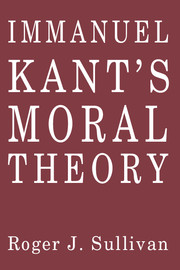Book contents
- Frontmatter
- Contents
- Preface
- Key to abbreviations and translators
- 1 Introduction
- 2 The context for Kant's moral philosophy
- Part I The nature of morality
- Part II The moral norm for persons
- Part III The norm for moral judgment
- 11 The Categorical Imperative
- 12 The Formula of Autonomy or of Universal Law: Part I
- 13 The Formula of Autonomy or of Universal Law: Part II
- 14 The Formula of Respect for the Dignity of Persons
- 15 The Formula of Legislation for a Moral Community
- Part IV Kant on history, politics, and religion
- Appendixes
- Notes
- Bibliography
- Index of names
- Index of subjects
13 - The Formula of Autonomy or of Universal Law: Part II
Published online by Cambridge University Press: 05 June 2012
- Frontmatter
- Contents
- Preface
- Key to abbreviations and translators
- 1 Introduction
- 2 The context for Kant's moral philosophy
- Part I The nature of morality
- Part II The moral norm for persons
- Part III The norm for moral judgment
- 11 The Categorical Imperative
- 12 The Formula of Autonomy or of Universal Law: Part I
- 13 The Formula of Autonomy or of Universal Law: Part II
- 14 The Formula of Respect for the Dignity of Persons
- 15 The Formula of Legislation for a Moral Community
- Part IV Kant on history, politics, and religion
- Appendixes
- Notes
- Bibliography
- Index of names
- Index of subjects
Summary
In the preceding chapter, we saw that Kant maintained that the Categorical Imperative is the only norm we need to guide our moral judgments: By itself, it is both the necessary and sufficient criterion for correct moral judgments. But using that norm properly requires us to observe three procedural protocols. First, we must take the laws of the world of nature as a model of the universal form of and consistency between laws in a possible moral world. Second, we must test maxims for their moral acceptability only within the context of that ideal world already formed by morally obligatory laws. Finally, since reason is an intrinsically teleological faculty, the ideal moral world, which is based on reason alone, must be a world of objective and mutually compatible ends. So every morally acceptable action-type must have an end compatible with all other ends in that world. One of the variants of the Categorical Imperative reads: “Act according to a maxim of ends which it can be a universal law for everyone to have” (M.M. 395). Kant himself thought of this as a variation of the second formula, but since every maxim at least tacitly contains an end, this could just as easily be taken to be a version of the Formula of Universal Law.
Thus far, we have tested maxims against common human social practices such as promising, each having its own given “natural” purpose.
- Type
- Chapter
- Information
- Immanuel Kant's Moral Theory , pp. 180 - 192Publisher: Cambridge University PressPrint publication year: 1989



